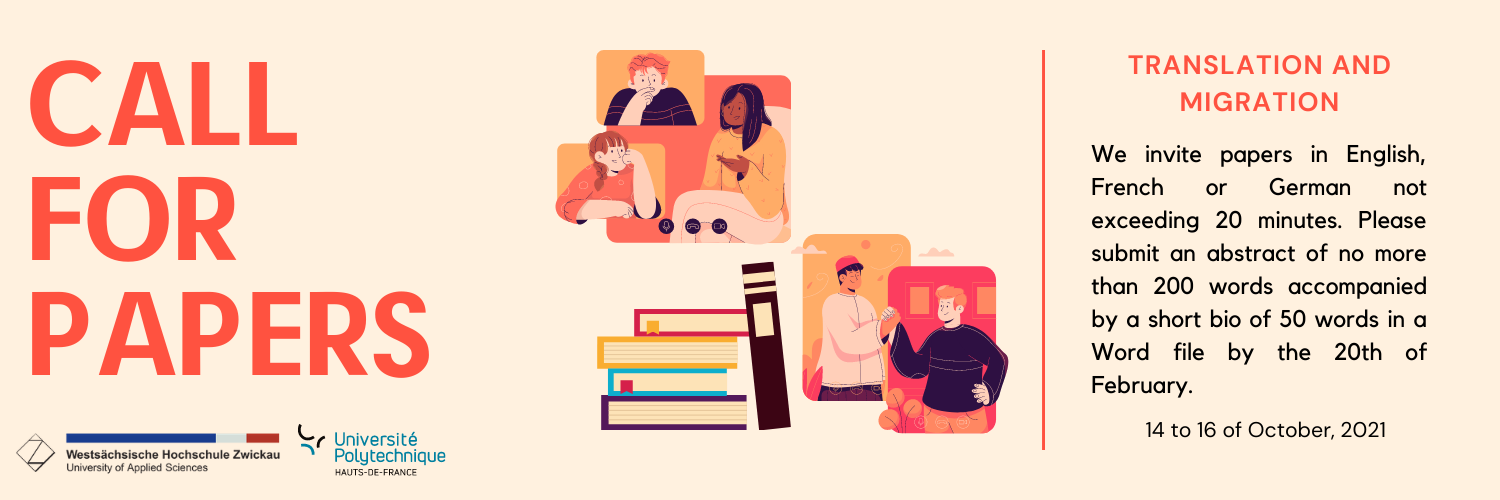
TRANSLATION & MIGRATION
Migration and translation are closely related phenomena in the contemporary world. The reasons for moving from one country to another are diverse, ranging from security, demography and human rights to poverty and climate change. Whether migrants have left their home country to escape political persecution or to find better living conditions elsewhere, they have to adapt to a new cultural and linguistic environment. Communication plays a key factor in the integration of migrants. The acquisition of new language skills is often made possible by means of translation. In this context, translation is not only to be seen as the mere transfer of written or oral discourse from one linguistic context to another, but also as an act of cultural transfer.
Community interpreters, for example, are directly confronted with the language barrier which migrants have to face. They intervene at different levels, facilitating exchanges between migrants and different social actors, such as the police, psychologists, doctors, educators, judges etc. As each situation involves specific translational and ethical issues, they must be both "language experts" and "cultural mediators". They are required to translate accurately and at the same time to shed light on the exact meaning of the words used in the exchange. The interpreter must also grasp the nuances of verbal and non-verbal communication and often provide cultural explanations. However, the level of empathy with the speaker may conflict with the interpreter's code of ethics, which prescribes neutrality and impartiality.
In the integration of migrants, education plays an important role. In this context, the question arises as to how multilingualism is taken into account in the domain of education. Are the native languages of migrant children actively integrated at school, or are they branded as inadequate in classes dominated by the majority language? Do national education systems develop specific pedagogical and translational approaches, helping migrant children to acquire the language of their host country? Can translation, or the absence of translation, be considered as a political act? It is also interesting to investigate in which way the language(s) of the receiving society on the one hand, and languages spoken by migrants on the other interact with each other. Do new linguistic varieties emerge? What language contact phenomena can be observed?
A further way exploring the link between migration and translation is the investigation of migrant literature. Frequently, the experience of migration becomes accessible to readers from another cultural sphere through translation. In the case of authors writing in their mother tongue, the readers of the host country gain access to their text via translation. If migrant authors have already adopted the language of their host country, their work may travel to additional countries thanks to translation. In this context, it is interesting to explore the different ways in which migrant literature as a cultural product circulates from one cultural area to another. What are the social conditions of production and reception? What are the factors determining the market for the translation of migrant literature? The translation of migrant literature presents a particular challenge for translators as the language used by the authors is often a hybrid type of writing marked by the substrate of their mother tongues. Frequently, translators are confronted with the effects of diglossia, such as the transcription of a mispronounced language, the imitation of a foreigner’s accent or a dialect.
The experience of migration finds its expression not only in literature but also in music. Music is particularly relevant when it comes to understanding the experience of migration, as it does not concern an elite but a great majority of the population, both in terms of production and reception. In the context of migration, it is preferable not to study music using the model of literature, i.e. focusing on the lyrics only, but to have an approach that includes music too, as well as the interaction between music and lyrics, in cases when lyrics are involved. This allows the researcher to fully grasp the place of music within migrant communities and its influence on the host culture. The migration of music from the source culture to the host culture is often caught in a tension between a desire to preserve some form of purity and the threat of cultural appropriation. This ambivalence is found in the song translation, more particularly in the choice between domestication and foreignisation, as defined by Lawrence Venuti.
We invite papers in English, French or German not exceeding 20 minutes. Please submit an abstract of no more than 200 words accompanied by a short bio of 50 words in a Word file by the 20th of February to one the following email addresses:
Stephanie Schwerter: stephanie.schwerter@uphf.fr
Jean-Charles Meunier: jean-charles.meunier@uphf.fr
Nadine Rentel: nadine.rentel@fh-zwickau.de
For more information and topic suggestions, click here.

